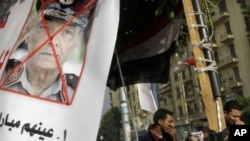Egypt is entering the next stage of its transition with parliamentary elections, the first since massive street protests forced former President Hosni Mubarak to resign in February.
The complex, staggered polls to elect parliament's lower house begin Monday and conclude in early January. Elections for the upper house end in March, after which the newly elected assembly will write a new constitution.
The head of the ruling military council, Field Marshal Hussein Tantawi said Sunday the country is at a crossroads and can choose either successful elections "leading Egypt towards safety" or face dangerous hurdles that the armed forces "will not allow." He also warned of "extremely grave" consequences if the country's current political turmoil does not end quickly.
Photo Gallery: Protests in Tahrir Square
|
Major Alliances for Egypt's Parliamentary Elections Democratic Alliance for Egypt: Formed in June 2011, it was the first significant political coalition to emerge after President Hosni Mubarak's February resignation. The coalition is led by the Muslim Brotherhood's Freedom and Justice Party and includes at least five other political groups. The alliance started out as a broad-based coalition of liberal and Islamist parties but some of its original members left due to ideological differences. Islamist Alliance (Alliance for Egypt): Led by the Salafist party al-Nour and includes at least two other groups. Its members were originally part of the Democratic Alliance but split because of a disagreement over the number of candidates they would be able to field in the elections. The Islamist Alliance formed in late September. Egyptian Bloc: The liberal coalition has lost members since its formation in August and now includes only the Free Egyptians, Social Democratic and al-Tagammu parties. The bloc says it hopes to bring together political forces that are committed to a civil democratic state based on a principle of separation between religion and politics. Completing the Revolution Alliance: Formed in October, the alliance includes youth, socialist, liberal and moderate Islamist parties. Most were formerly part of the Egyptian Bloc. Members include the Revolutionary Youth Coalition, the Egypt Freedom Party and the Socialist Popular Alliance Party. |
Field Marshall Tantawi's warning came as thousands of demonstrators filled Cairo's Tahrir Square for another massive protest Sunday demanding that Egypt's military immediately cede power to a "national salvation government" that would run the country until a president is elected.
A number of the revolutionary youth groups leading the protests have proposed that opposition leader and Nobel Peace laureate Mohamed ElBaradei head an interim civilian administration with deputies from across the political spectrum. The proposed body would replace the ruling military council in supervising Egypt's transition to democracy.
ElBaradei said Saturday he would abandon his bid for Egypt's presidency if formally asked to lead such a government.
Meanwhile, there has been another attack on a gas pipeline in Egypt's Sinai Peninsula, just hours before the start of the polls. State-run news agency ((MENA)) reported saboteurs attacked a section of the pipeline about 60 kilometers west of the town of El-Arish early Monday.
This is the ninth time this year that saboteurs have targeted the pipeline which supplies natural gas to Israel and Jordan. The last attack was carried out on Friday.
Earlier this month, Egyptian police arrested Mohammed el-Tihi, a leading member of an armed Islamist group suspected of several of the bombings.
Previous attacks have disrupted fuel supplies for weeks.
Some information for this report was provided by AP, AFP and Reuters.















